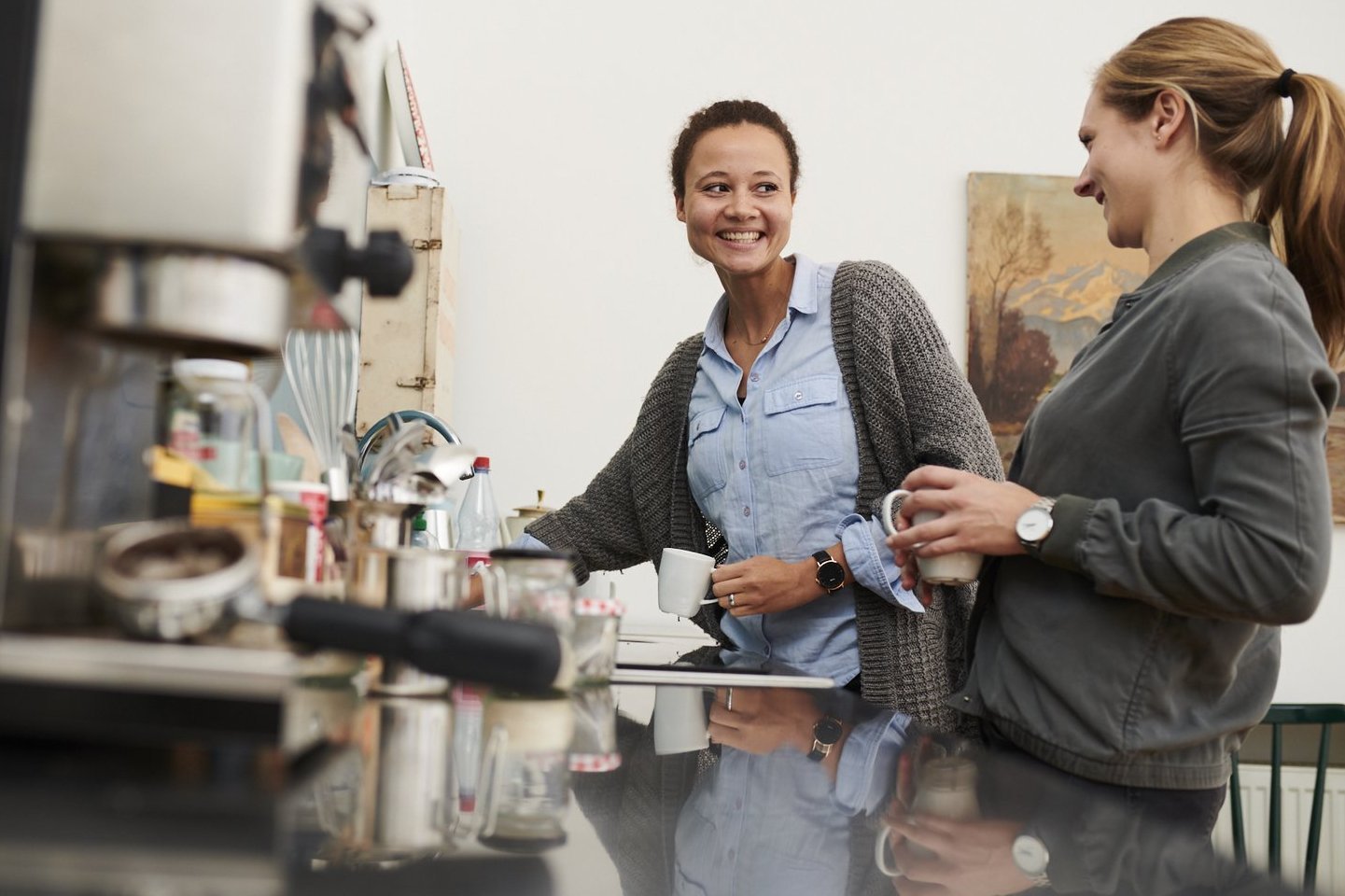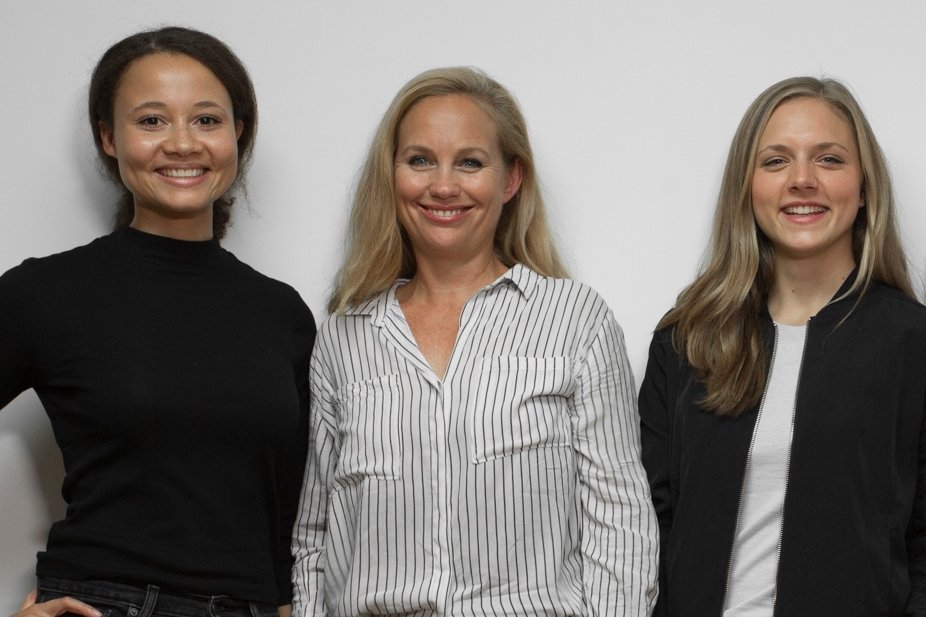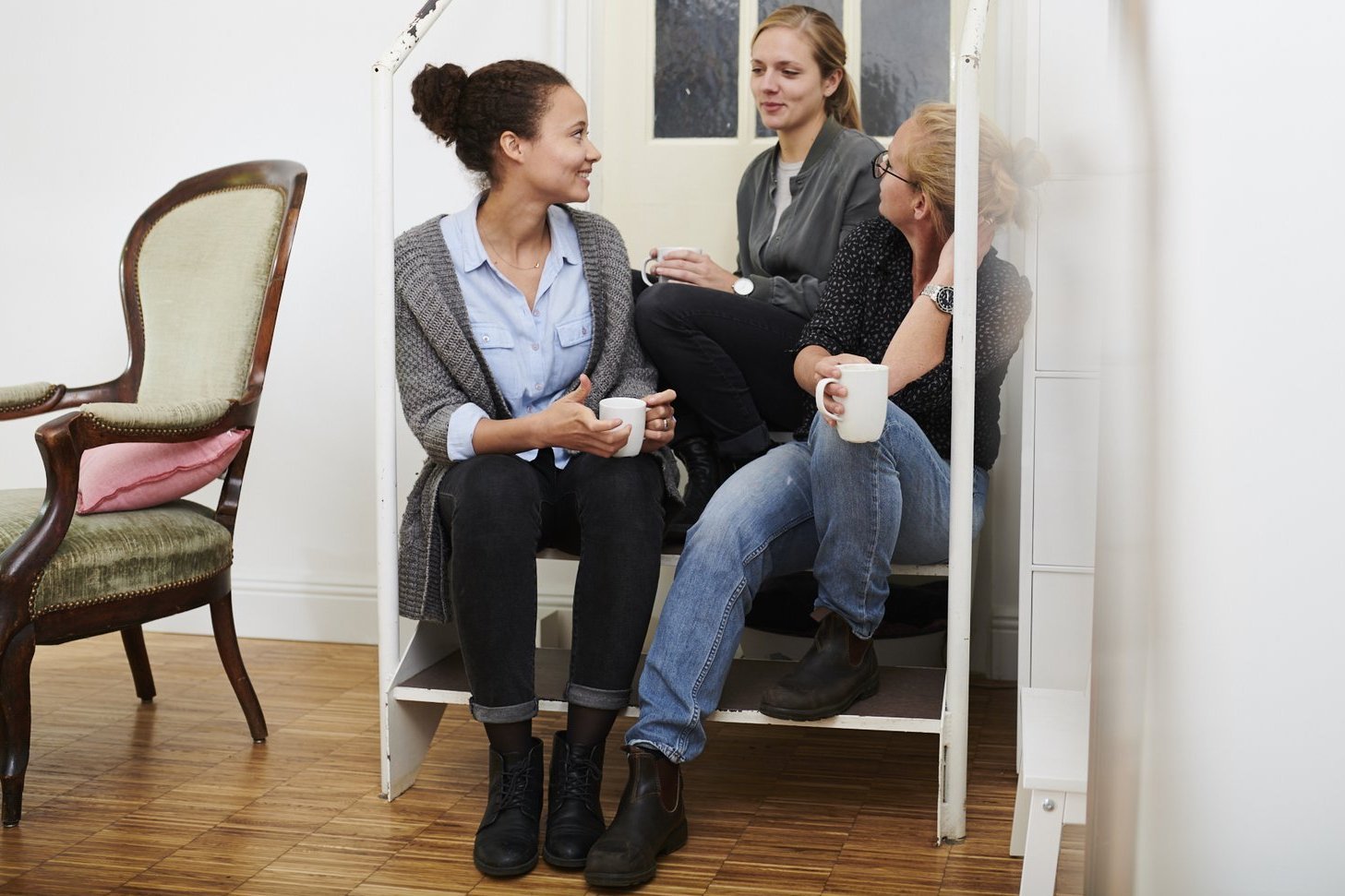“We wish to invest our lifetimes wisely and usefully”

For a good three years, Joana Schönborn, Sina Wans (both 29) and Lina Ebbinghaus (43) have been running the business consulting firm ‘Sustainable Thinking’. Their stated mission: to introduce a level of dynamism to the transformation of businesses to a more sustainable, future-oriented way of trading. The three graduates of h_da manage risks and point out opportunities and possible competitive edges. As young founders Joana Schönborn and Sina Wans say, you need to relish the excessive demands – and make sure that workloads are held in check.
Mrs Schönborn, Mrs Wans, your initial study courses were concerned with civil engineering and apparel. When did the issue of sustainability appear on the horizon for you?
Sina Wans (SW): I took my Bachelor’s in International Fashion Retail in Reutlingen first. It became very quickly apparent that the textile industry was in dire need of a transformation, because of the extremely negative effects it has on the environment and humans. A professor inspired me to adopt a course towards instigating a sustainable textile industry.
Joana Schönborn (JS): The topic of sustainability never emerged during my civil engineering studies in Wiesbaden. However, in private, I was certainly confronted with consumer behaviour and foodstuffs. From the beginning of my career, I felt dissatisfied with my circumstances, and I found myself wondering how I could become more involved with sustainable development projects.
How did you come across the RASUM degree course (see also the info box)?
JS: I was already registered for a Master’s degree course in civil engineering at the h_da way back in October 2015. Simultaneously, I was searching around online for a strategically compatible Master’s degree course, when I happened upon RASUM. On the very same day I bumped into Sina in the corridor and asked her what she was studying. She was astounded to find out that I knew what RASUM was about.
SW: Well we persuaded Joana to enrol, bring the total number of students on our pioneer degree course to eight. At the time, Martin Führ (DE) had a research project dealing with sustainable textiles and chemicals – which suited me down to the ground.
As the degree course lived up to expectations?
JS: At the start I felt I wasn’t being given enough material to learn off by heart, because this was what I was so used to. Instead, we learned how to work autonomously, by building up the confidence to deal with new issues and view these from a more systemic perspective.
SW: This is one of the great things about RASUM. It doesn’t focus on compiling a sustainability report, or drawing up a sustainability management draft. For this is knowledge that we can all assimilate for ourselves – as each of us constantly does on a daily basis. Learning by rote cannot provide you with the tools and requisite know-how to properly support the transformation of business models towards more sustainability.
You seem convinced that you’ve acquired these tools, or how come you founded Sustainable Thinking (DE) before completing your Master’s degrees?
JS: We worked on plenty of practical projects during our studies, a lot of the time together with Lina Ebbinghaus, Jana Kutschmann and Robin Weyrich. It all worked supremely well and was loads of fun.
SW: We wanted to continue working together in this team, so founding the firm seemed inevitable.
JS: During the course of our projects we noticed that sustainability departments in businesses often lacked effective clout. The influence they wielded seemed too weak to effect a genuine transformation to us.
SW: Sustainability managers in companies are all too seldom involved in strategic decision-making processes. Yet preparing companies to become sustainable urgently requires the requisite strategic decision-making powers. With this common motivation behind us we founded Sustainable Thinking towards the end of 2017. Founding something together with friends – it almost sounds romantic. However, by dint of our joint endeavours in all the projects, the five of us were well aware of how each of us ticks and works, of which skills we possess. We know full well what we were getting ourselves into. The human and specialist chemistry works – and is one of our hallmarks.
The Master’s degree course „Risk Assessment and Sustainability Management (RASUM) (DE)" was first offered by the social sciences faculty at h_da during the winter semester 2015/16. The four semester study course is intended to convey to students an ability to assess risks and opportunities which arise from the necessary transformation towards a sustainable development. By dint of these abilities, RASUM graduates become important consultants, especially for those companies wishing to implement the requisite transformation processes and a sustainability management programme.
Students assimilate strategic and analytical skills that help them to transcend system-inherent limitations. The integrated approach towards complex issues thus achieved incorporates economic, social-psychological, societal, organisational as well as technical and scientific perspectives and aspects. Trans-disciplinary project activities form the core of the degree course, whereby students work closely with professionals in order to solve actual problems which arise during the company’s daily business.
The two year conception phase of the degree course receives financial support from the European Social Fund (ESF), whereby representatives or companies and other organisations, working in conjunction with scientists from a variety of disciplines, managed to develop what is a unique concept within the German academic landscape. Already in 2014, it was designated as the official project of the ‘World Decade of Education for Sustainable Development’ (BNE) by the German UNESCO commission.
Yet nonetheless, now there are only the three of you …
JS: After completing his Master’s degree, Robin Weyrich took up full-time employment, which is why he quit in 2018. Jana Kutschmann left towards the end of 2020 because she felt drawn more towards theory and education, a field we have yet to approach. We all parted on the very best of terms, and now the team works together as a trio.
SW: Founding something is also partly a path towards self-discovery. We’ve granted ourselves plenty of time to answer the questions: who are we? What are we capable of? What do we wish to achieve? It’s radically different to accepting a job and having a boss telling you exactly what to do. Founders have few benchmarks, but one hell of a learning curve. You make mistakes and acquire knowledge off your own bat, so you’re actually constantly overstretched – you really do have to love it (laughs). Nonetheless, today we know a lot more precisely we want and what we’re capable of.
Which kinds of services do you offer?
SW: We’re experts at risk and sustainability management, offering businesses support in developing future-oriented ways of trading. Our three areas of activity are: climate risks and management, sustainable supply chain networks and circular economies.
JS: Issues involving the climate and supply chains are already highly in demand. Circular economies is more a next-level topic, which will come more to the fore once businesses have addressed the other two somewhat.
SW: Our USP is our new approach to consulting. We developed it ourselves, from our personal aspirations to accelerate a sustainable transformation of the economy. Adhering to a 1:1 consultation format doesn’t move things along quickly enough. To this end, we bring businesses together in ‘Thinking Circles’ in the form of peer-to-peer learning communities. This provides highly effective and potent leverage!
So a kind of networking?
SW: Not quite, there are plenty of networks around, yet they often prove ineffective. The Thinking Circles are genuine, honest-to-goodness, communities. Over up to a year, five to seven businesses will develop joint climate strategies, or establish sustainable supply chains. Using our specialist input we manage to bring together the businesses’ experiences. We organise everything, making all the arrangements in advance and post-event.
Who are your clients?
JS: We’re active cross-sector and nationwide. Our smallest client employed ten staff, the largest to date employs 16,000.
SW: Our clients mainly comprise of medium-sized businesses who have acknowledged that cooperation brings the most dividends in issues of sustainability, and that adopting sustainable ways of trading gives them a competitive edge. Just like ourselves, they wish to move forwards more quickly. The Thinking Circles bring together companies facing similar challenges, but not direct competitors. Trust, transparency and the ability to cooperate are the key prerequisites.
How do you get paid?
SW: The companies pay a monthly contribution determined on an individual basis, according to size. It’s an inclusive and cohesive concept that stems from the communal and solidarity-based economies. It is completely transparent for all – and it works very well indeed.
Has Covid changed your business in any way?
SW: The pandemic has forced all of us to pause, in a sense. It’s also spurred us on to scrutinize things more in a professional context.
JS: The crisis has shown us that a rethink is possible – for example, video conferences in place of physical meetings. It has even shown us all that we are capable of adapting to rapid changes. We truly hope that this optimism and willingness to change is transferred to sustainability issues – and thus bear durable fruits.
What is the current state of affairs amongst players in politics and the economy at large in terms of awareness of climate change, resources and sustainability?
JS: It’s our impression that in 2020 these issues finally began to be taken more seriously in political circles. Laws have been passed which actually could make a certain difference. The whole complex has been given more drive, mainly because the financial sector has recognised just how much financial damage will result if we fail to act now. Capital providers demand transparency from companies, whilst the EU requires, via its taxonomy regulations, proof that investments are ecologically sustainable. Both of these forces apply enormous pressure on businesses. Sustainable financial streams are a major lever to enact change.
SW: Compliance requirements and expectations on the part of capital providers are the external forces acting on businesses. Notwithstanding, current developments within many companies themselves are incredibly exciting. Many of them have comprehended that they need to address the issue of sustainability. The question now is: who will grasp the nettle and end up the winner, and who are the objectors destined to lose out to competitors? Sustainability issues always entail huge levels of risk, if one remains inactive. Yet also immense opportunities: if a business finds a solution and is thus, for instance, able to clearly position itself as the supplier with the most sustainable offer in its branch. Companies increasingly acknowledge such opportunities in sustainable economic activity. Whereby traditional German entrepreneurship is unfortunately very conservative.
JS: Companies in Holland or Scandinavia grasped much earlier that sustainable trading models would make them fit for the future and more successful.
You’re both around 30, and yet you advise business-people on strategic decision-making. Do you ever encounter any reservations?
SW: No, not in the slightest. Our clients are always perfectly on a par with us, we work together with some great people. If once things didn’t quite work, this was for purely professional reasons. Both age or gender do not impede at all.
What are your intermediate professional objectives?
JS: Most certainly to continue generating a dynamic thrust! Plus, only to grow as a team in so far as this helps us to achieve our goals. Furthermore, our most important common aim is to ensure that our professional self-realisation always harmonizes with how we develop as people.
SW: We love what we do – and how we all do it together. But none of us is a workaholic. We take care of ourselves and each-other; drawing clear, protective, lines in the sand – we go on holiday and we don’t work weekends! We really want to just carry on doing what we can as a team, helping to render the economy more sustainable … and invest our lifetimes wisely and usefully!


